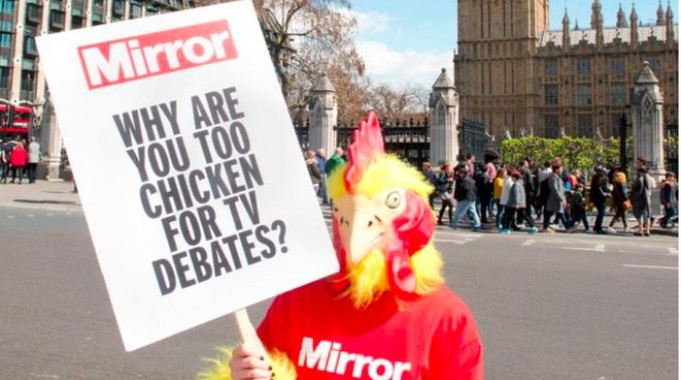Will she? Won’t she? And why won’t she?
Ever since Britain’s Prime Minister Theresa May announced a surprise snap poll after returning from a walking holiday over Easter with her husband, one debate that threatens to overshadow all others is her announcement that she will not take part in the now customary television debates with her political opponents in the run up to the election on June 8.
The question has already been unplugged on the airwaves. The barometer has been rising as broadcasters and the opposition parties debate the ‘will she? won’t she? why won’t she?’ issue over her boycott.
If you won’t debate, we will put an “empty chair” in your spot, the broadcasters threatened, egged on by the Liberal Democrats who first flagged the idea of an empty chair.
ITV was the first channel to say that they would do a televised debate of the leaders. Sky TV on day two came out with a poll which said 64 per cent of the people polled wanted to see a TV debate between the leaders where they argue out their policies, 31 per cent said ‘no’ to a TV debate and five per cent were undecided.
The broadcasters have been unanimous in asserting that debates are “good for democracy”. The BBC’s star anchor David Dimbleby in a Radio 4 interview offered a tongue- in-cheek critique of May’s refusal as not quite the kind of attitude that will go down well in a democracy. You mean to say she will say you have questions but no, I won’t come debate them? The BBC has said they are still formulating their programming.
But May, pushed into a corner of her own making, has so far (at the time of writing this piece) refused to yield. By Wednesday night, there were hints filtering out of Downing Street that she would do several one-to-one interviews with channels and may even consider doing a Question Time with a live audience where people would be given a chance to question her on her policies and manifesto.
On an earlier occasion, former prime minister David Cameron had also refused to take part in a TV debate with his opponents. But after he was ridiculed as “chicken” by the Daily Mail, he had to yield. The Guardian this time ran a rather unflattering four column ‘chicken’ cartoon on May.
It has been open season on British television, with much recalling of pre-election TV debates in the US and UK. The classic black and white image of a cool and calm Robert Kennedy versus a sweaty and shifty Richard Nixon has been much shown to illustrate the power of body language and image on TV. Then recently there were the classic ones with Donald Trump and Hillary Clinton slaying each other and not shaking hands on stage.
The UK’s debates have not been the classic presidential ones seen in the US because here it is a parliamentary democracy with various political parties in the fray. What the broadcasters were hoping for - and the people would have perhaps liked - was a head to head between May and Labour leader Jeremy Corbyn, a passionate advocate for the marginalised and the Scottish National Party’s Nicola Sturgeon, a formidable speaker on Scotland’s rights.
May loves giving a tongue lashing to Corbyn and Sturgeon (although Sturgeon is not in the Commons and is in the Scottish Parliament) at every given chance in Parliament during Question Hour, so why won’t she agree to a public format where she can do that openly on television? This is the question confounding everyone.
It’s not her ‘style’, say some of her supporters. One Conservative MP told a broadcaster: “TV debates are good business for you and offer you a good stage but we don’t have to agree to everything you want us to do”.
May herself says she prefers to be out and about amongst voters. As a Sky News anchor pointed out: “It’s all very well for her to want to be in the comfort of Town Hall meetings surrounded by handpicked dyed-in-the-wool Tory supporters….but the hard questions that she needs to answer will not be answered in those forums”.
Sturgeon took to social media to say that the TV debates should go ahead without May. Other critics said that May will not be able to defend the lies she has told, including having repeatedly said she will not call mid-term polls, and this is why she is afraid.
During Question Time in the House of Commons there was sharp attack from Corbyn: “Theresa May says this election is about leadership..come on show some! Let’s have a debate, it’s what democracy needs and the British people deserve”.
What Corbyn, who himself is fighting huge dissidence from inside his party, probably relishes at this juncture is a one to one with May on her policy flip flops.
Tim Farron of the Liberal Democrats was equally critical. “By dodging a TV debate the Prime Minister is dodging scrutiny and it also reveals that she hold the public in contempt.”
On a BBC programme analysing the newspapers, Lucy Fisher, senior political correspondent of The Times asked: “Debates are fun. Why won’t she agree to it?” A TV anchor pointed out the risk May was running: “In the Prime Minister’s refusal to take part in TV debates, there is a danger that it has become a running story”.
A running story is indeed what it has already become and it’s likely to become even more prominent in the seven weeks remaining to the polls.
